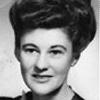Oriel Gray lived in Sydney during the early part of her writing career and later re-located to Melbourne. Gray's major output as a playwright was in the period from the 1940s to the 1960s. Her plays are regarded as being ahead of their time due to the complex manner in which they deal with social issues. Gray inventively addressed issues of Aboriginal rights, life in the bush, migrant experience and women's employment.
Her first full-length play, Lawson, based on some of Henry Lawson's short stories, was produced by Sydney New Theatre, in 1943. Gray's play, The Torrents, was joint winner of the 1955 Playwrights' Advisory Board Competition with Ray Lawler's Summer of the Seventeenth Doll. However, unlike the Doll, The Torrents did not receive ongoing acclaim. After a production in 1956 by New Theatre, Adelaide, it was not re-staged for 40 years; it was (poorly) revived at the Adelaide Festival in 1996. In her last published work (and her only novel), The Animal Shop, Gray returned to familiar themes—working women and class conflict.
Gray's work received most attention within the New Theatre movement. These left leaning theatre groups were generally founded by then Communist Party members and sympathisers, and women's writing was more freely accepted there than in the mainstream Australian theatre of the time. Gray, a member of the Communist Party of Australia through the 1940s, worked with New Theatre as both a writer and an actor. (This phase of Gray's life is covered extensively in her 1985 autobiography, Exit Left : Memoirs of a Scarlet Woman.) Gray's two marriage partners were both associated with New Theatre in Sydney. She was first married to John Gray and subsequently to John Hepworth.
In addition to writing for stage, Gray wrote extensively for radio and television. During the 1950s, Gray worked on the development of children's education programmes for the ABC and later produced scripts for episodes of Rush, Bellbird and The Sullivans.
Considerable attention is given to Gray in Michelle Arrow's 2002 critical work Upstaged : Australian Women Dramatists in the Limelight at Last. The playwright Merrilee Moss wrote her PhD (Monash University) on Gray in 2016, and a play, Oriel, based on her life, which was produced by La Mama Theatre in Melbourne, September 2016.
AustLit is publishing some of Gray's plays from 2017 as a part of the Australian Drama Archive.
 1788716200789823446.gif
1788716200789823446.gif

